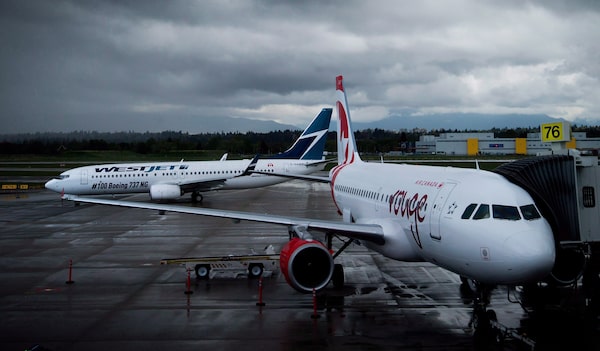
A Westjet Boeing 737-800, left, taxis past an Air Canada Rouge Airbus A319 at Vancouver International Airport in Richmond, B.C., on April 28, 2014.DARRYL DYCK/The Canadian Press
The federal government is facing renewed pressure to bail out Canada’s airline sector, which was left out of Finance Minister Chrystia Freeland’s economic statement on Monday.
Ms. Freeland announced a series of spending measures aimed at mitigating the economic impact of the COVID-19 pandemic, including new credit for the tourism and hospitality industries, $186-million for small and regional airports and $206-million to support regional air transportation. Airports were granted an extension or deferral of rent payable to Ottawa.
The government also said it is “establishing a process with major airlines regarding financial assistance,” but announced no bailout for the airline sector, which laid off thousands of employees, grounded planes and halted much of its operations as demand for travel plunged in the pandemic.
Leisure carrier Sunwing Airlines said on Tuesday it is “disappointed” at the lack of sector-specific relief.
“We have co-operated with government directives and patiently waited for a lifeline that would preserve our business over the months ahead,” Sunwing spokeswoman Melanie Filipp said in an e-mail to The Globe and Mail. “We remain hopeful about the government’s comments in relation to airline support, but the message to keep waiting for details is a difficult one for our industry.”
Daniel-Robert Gooch, president of the Canadian Airports Council, said the supports in Ms. Freeland’s statement fall short of what the air travel sector needs. He said the rents airports pay are based on revenue, and the relief is short-term and of little value.
The industry is also urgently awaiting the rollout of a national COVID-19 rapid-testing system similar to a pilot project in Vancouver that is testing departing international travellers. Mr. Gooch said the government has drafted a framework for testing at airports, but he is not sure when it will be announced or implemented.
“We really have about three or four months to get this right,” Mr. Gooch said by phone, “to get a system of testing in place if we are to be able to participate in the recovery in travel and tourism that we think other countries are going to see next year.”
Robyn van Teunenbroek, a spokeswoman for Toronto-based Porter Airlines, said it is not clear if the announced rent relief will be extended to airlines. The airline is embroiled in a legal battle with the owner of the terminal at Billy Bishop Toronto City Airport over payments for landing slots while Porter remains grounded.
“Porter will continue engaging with the government, as requested, to help finalize a support program for travel and tourism companies,” Ms. van Teunenbroek said. “We do not have insight into what form this may take and look forward to seeing further details.
Ottawa previously announced $192-million in support for essential air routes in remote and northern communities, and provided large loans to some airlines through Export Development Canada, in addition to 75-per-cent wage subsidies for all airline employees.
Tim Perry, president of the Canadian branch of the Air Line Pilots Association, which represents WestJet and Air Transat pilots, said the support for the airports should have positive spinoff effects for the airlines, but the union needs more details.
“We remain hopeful that the government will finally act to support this essential sector, and as we await further details we will continue to insist any eventual support for the airlines must protect our members and other airline workers who have already paid more than their fair share as struggling airlines weather the turmoil caused by the global COVID-19 pandemic,” Mr. Perry said.
Airlines have urged the government to provide sector-specific aid, in the form of grants, low-interest loans and a COVID-19 testing system at airports that would allow travel quarantines to be shorter or eliminated. The carriers also want the government to drop its demand that customers get refunds for flights cancelled during the pandemic.
On top of the refund requirement, the government’s demands include access to airline financial information, assurances carriers will not cancel orders for Canadian-made planes and protection for regional routes that are vital to parts of the country.
WestJet and Air Canada Air Canada referred questions to their industry lobby group, the National Airlines Council of Canada. The group said in a statement Canada’s lack of aid for its airlines makes it a “global outlier.”
Mike McNaney, head of the airline group, said it is “very urgent” that Ottawa craft a rescue package that includes financial aid, breaks on fees and testing. He said Canadian carriers have lost 85 per cent of their operations, and are seeing new competition for Canadian travellers from international airlines that have been helped by their own governments.
Your time is valuable. Have the Top Business Headlines newsletter conveniently delivered to your inbox in the morning or evening. Sign up today.
 Eric Atkins
Eric Atkins